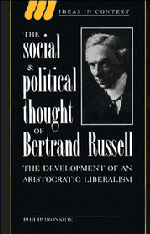Book contents
- Frontmatter
- Contents
- Acknowledgements
- Introduction
- 1 A young man of character
- 2 Fellow-travelling with the Fabians
- 3 Out of the moral gymnasium
- 4 Political science
- 5 The sage of Caxton Hall
- 6 Anarchist tendencies
- 7 Russia, China, and the West
- 8 The Wellsian trajectory
- 9 Ideologies and dystopias
- Epilogue: Russell and the idea of the clerisy
- Notes
- Bibliography
- Index
- IDEAS IN CONTEXT
Epilogue: Russell and the idea of the clerisy
Published online by Cambridge University Press: 31 August 2009
- Frontmatter
- Contents
- Acknowledgements
- Introduction
- 1 A young man of character
- 2 Fellow-travelling with the Fabians
- 3 Out of the moral gymnasium
- 4 Political science
- 5 The sage of Caxton Hall
- 6 Anarchist tendencies
- 7 Russia, China, and the West
- 8 The Wellsian trajectory
- 9 Ideologies and dystopias
- Epilogue: Russell and the idea of the clerisy
- Notes
- Bibliography
- Index
- IDEAS IN CONTEXT
Summary
Bertrand Russell, though an aristocratic Liberal who was impatient of politics, suspicious of the state, indifferent to production, and whose central theme was the importance of a natural elite (or more particularly the exceptional individual), sustained a reputation as a radical intellectual for most of a long career. In a sense this is not the paradox it seems as Russell's impatience with parliamentary politics must be set alongside his extra-parliamentary activity culminating in his involvement with CND – an involvement which demonstrated that his Gladstonian passion for the ‘single great issue’ was undiminished. His suspicion of the state, though illustrative of a residual Whiggism which made for an uneasy relationship with Socialism, also allowed for the incorporation of Pluralist and even Anarchist elements into his thinking. The indifference to production, which could be construed as an indifference to working-class aspiration, stemmed from a belief that in the West at least the technology was already available to meet existing needs. For Russell, a rational society would be one in which progress was measured, not by increased consumption, but by an increase in the number of those with sufficient leisure to realise the ‘true ends of life’. The radical implications of a ‘natural’ elite are less clear, though as Russell saw one of its functions to be that of maintaining a vital culture while embodying the aristocratic ideals of civility, spontaneity, individuality, and creativity, it could be said to provide a model for a burgeoning meritocracy.
- Type
- Chapter
- Information
- The Social and Political Thought of Bertrand RussellThe Development of an Aristocratic Liberalism, pp. 209 - 227Publisher: Cambridge University PressPrint publication year: 1995



